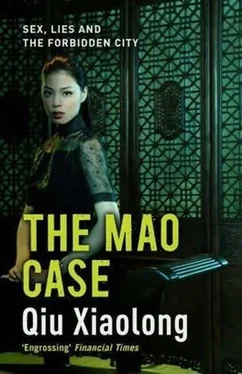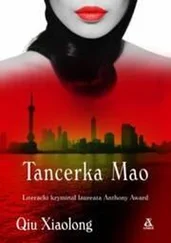“Not that I know of.”
“Do you think she could have left them behind somewhere?”
“No, I don’t know that, either.”
For her age, she proved to be more than alert. So he decided to push on in a new direction.
“Oh, Buddha is really blind. Such disaster for Shang, and for Qian too. They did nothing to deserve such kalpa or karma.”
“Don’t ever talk like that, Mr. Yu. Buddha is divine. Karma works out in a way far, far beyond us. whatever might have happened to Shang and Qian, a real guiren finally came to Jiao.”
“What do you mean?” He added in haste, hardly able to conceal the excitement in his voice, “Didn’t Jiao grow up in an orphanage, alone all those years?”
“Someone helped her through those years – a guiren in the background. Now that Jiao has settled down comfortably, I think I can leave the world in peace. Buddha is so great!”
“Oh? Who helped?”
“A gold-hearted man.” She rose to put some tall incense into the burner. “I burn incense for him every day. May Buddha protect him!”
“Hold on, Auntie Zhong. A guiren in Jiao’s life. How do you know?”
“Like you, some people know about my relationship with the Shang family. So he came to me one day.”
“What kind of a man is he?”
“A real gentleman. He said that he knew Jiao’s parents. He is about their age, I guess. He gave me money to buy food and clothing for Jiao.”
“When did that start?”
“Two or three years after the end of the Cultural Revolution. In the late seventies or early eighties. He did all his good deeds anonymously, insisting that I not say anything to Jiao. What noble benefaction!”
“What Buddhist spirit!” he sort of echoed, trying to come up with more Buddhist improvisations. “A peck, a drink, everything happens with a cause and consequence.”
“You, too, kowtow to Buddha, don’t you? He might not have been that rich at first, giving me just a little cash each time, but he must have come from a good family, the way he talked and behaved. Good deeds will never go unnoticed. Now he’s so incredibly rich. So is Jiao – all through his help.”
“Can you give me his name and address, Auntie Zhong? I really want to thank him for what he had done for the Shang family.”
“He sows without caring about reaping. In fact, he has never given me his real name.” She said shaking her head resolutely, “I wouldn’t give it to you even if I knew. It’s against his principles.”
“I don’t know how to thank you enough,” he said as he got up, realizing it would be useless to push any further. “Like that noble benefactor, you have done so much for her family. The way of Buddha is truly beyond us. Karma works out in the life of her granddaughter.”
“Yes, may Buddha bless her, and him too. Goodbye, Mr. Yu.” Zhong rose, and opened the door to the dark staircase.
He nearly stumbled again, beginning to grope slowly down, grasping the railing, his stiff legs moving with difficulty. It took him several minutes before he reached the foot of the staircase, the way down being even longer than the way up.
Walking out into the busy and bustling street, he blinked in a burst of afternoon sunshine. It was a random harvest. He lit a cigarette, waving the match. The information from Zhong threw light on some, if not on all, of the mysteries about Jiao’s life. Particularly regarding the self-effaced “incredibly rich” benefactor. Zhong seemed convinced that his fortune had brought about the metamorphosis in Jiao’s life.
Could the benefactor be the man Old Hunter had glimpsed in the company of Jiao the other night? Not likely. The man seemed to be younger, whereas Zhong described the benefactor as being about the same age as Jiao’s parents.
It wasn’t until he was passing by the convenience store again, that he thought of something. In spite of Zhong’s ambiguous response about what she had told Jiao about her benefactor, if the changes in her life had been related to him, Jiao should know him by now.
Jiao didn’t seem to have any friend that age – not from what he had learned from Chen – except Xie. An old-fashioned gentleman, and from a good family too, but Xie was far from rich.
So Old Hunter would get hold of a picture of Xie and with it, go back to Zhong. She might acknowledge the man in the picture even if she didn’t know his name.
He started humming some fragments from a Suzhou opera. “Bursting with anger, I denounce you…”
CHEN GOT A TEXT message on his cell phone early the following morning.
“I’ve talked to a friend who works at his residence. She’ll arrange a visit for you today. Her name is Fang, and her number, 8678856.”
The message was unmistakable, even though the sender didn’t leave a name.
He hastened out the hotel, got into a taxi, and headed for Tiananmen Square again.
The traffic wasn’t too bad along Chang’an Boulevard that morning. The taxi driver, for once, was not a talkative one, looking sullenly ahead, his face in the rearview mirror almost as gray as the sky. Chen rolled down the window. A pigeon whistle could be heard trailing high overhead.
It took him only fifteen minutes to arrive at Xinhua Gate, the magnificent front entrance to the Central South Sea, which was located just west of Tiananmen Gate.
Originally, the Central South Sea had been something of an extension of the Forbidden City, with gardens, lakes, villas, woods, halls, and studies for the imperial house hold. After the overthrow of the Qing dynasty, Yuan Shikai, the first president of the Republic of China, took the Central South Sea as his government office site. To Yuan, who later failed to become an emperor himself, the choice was symbolically significant, for the Central South Sea was synonymous with the Forbidden City.
After 1949, the Central South Sea was turned into a residential complex for the top Party leaders, enclosed by high walls, providing all the majestic luxury, privacy, and security imaginable for the residents inside.
That morning, the front of the Central South Sea appeared little changed from the Qing dynasty, presenting the vermilion gate, red walls, and glazed yellow tiles as of old. There were two armed soldiers standing at the front entrance. The half-open gate revealed a large screen bearing Mao’s gilded inscription: To serve the people.
Chen dialed the number sent in the text message. “Oh it’s you, Chen,” Fang responded. “Please come to the side entrance.”
So he walked over to a shaded side street, and to the alternative entrance also guarded by an armed soldier. Fang was waiting for him in a booth outside. A handsome woman in her early thirties, with almond-shaped eyes and a straight nose, highly spirited in her army uniform, she stepped out, extending her hand, a wisp of hair straying out of her green cap.
“So you must be Chen. The residence hasn’t been open to the public since 1989. Today you are a special visitor. Ling tells me you’re nostalgic.”
“Thank you so much, Fang, for going out of your way for me,” Chen said, believing Ling hadn’t revealed his real purpose. “It’s one of the places I’ve always wanted to see.”
“You don’t have to thank me,” Fang said in a crisp voice. “Ling called us, speaking to both me and my boss. She’s a friend of mine. She’s told me of you. She asked me to do whatever possible for you. For one thing, I could serve as your guide – that is, if you’d like.”
“I appreciate your offer, but I’d like to take a walk around first. If I need anything, I’ll let you know. Oh, but maybe a map?”
“Some other Party leaders still live here. You are supposed to walk around only the area where Mao used to live. Here is a map, and Ling has something else for you,” she said, giving him a large envelope with the map on top of it.
Читать дальше












